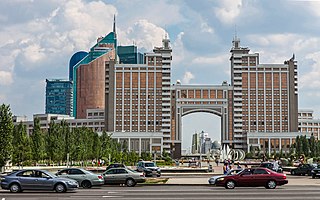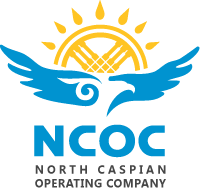Related Research Articles

Atyrau, known until 1991 as Guryev, is a city in Kazakhstan and the capital of Atyrau Region. Atyrau is a transcontinental city, at the mouth of the Ural River on the Caspian Sea, between Europe and Asia, 2,700 kilometres west of Almaty and 351 kilometres east of the Russian city of Astrakhan.
Tengiz field is an oil field located in Zhylyoi District, Atyrau Region, northwestern Kazakhstan.

Nurlan Utebovich Balgimbayev was a Kazakh politician who served as Prime Minister of Kazakhstan from 10 October 1997 to 1 October 1999.

The China National Petroleum Corporation (CNPC) is a major national oil and gas corporation of China and one of the largest integrated energy groups in the world. Its headquarters are in Dongcheng District, Beijing. CNPC was ranked fourth in 2022 Fortune Global 500, a global ranking of the largest corporations by revenue.
Karachaganak Field is a gas condensate field about 23 kilometres (14 mi) east of Aksay (Ақсай) in northwest Kazakhstan. It was once a massive Permian and Carboniferous reef complex covering an area 30 by 15 square kilometres. At its largest point, the reservoir contains a gas column 1,450 metres (4,760 ft) deep with a 200 metres (660 ft) deep oil rim below it. It is estimated to contain 1.2 trillion cubic metres of gas and one billion tonnes of liquid condensate and crude oil. Discovered in 1979, it began production under Karachaganakgazprom, a subsidiary of Gazprom. In 1992, AGIP and British Gas were awarded sole negotiating rights, forming a partnership company. In 1997, Texaco and Lukoil signed a 40-year production sharing agreement with the original two companies and the Kazakhstan government to develop the field for world markets. The agreement was turned under a partnership company known as Karachaganak Petroleum Operating (KPO) where Royal Dutch Shell and ENI are joint operators with a 29.25% stake each in the company, and with Chevron and Lukoil owning 18% and 13.5% respectively. In September 2009 the KPO filed an arbitration case against Kazakhstan. The Republic of Kazakhstan appointed Maksat Idenov to lead the negotiations, after which the arbitration was suspended towards an amicable settlement of the dispute and KazMunayGas engaged in entrance into the project in 2010. Under the terms of an agreement reached on December 14, 2011, the Republic of Kazakhstan has acquired through KazMunayGas a 10% stake for $2 billion cash and $1 billion non-cash consideration.
Kashagan Field is an offshore oil field in Kazakhstan's zone of the Caspian Sea. The field, discovered in 2000, is located in the northern part of the Caspian Sea close to Atyrau and is considered the world's largest discovery in the last 30 years, combined with the Tengiz Field. When discovered, it was the second largest oil field in the world.

The Caspian Pipeline Consortium (CPC) is a consortium and an oil pipeline that transports Caspian oil from the Tengiz oil field in Kazakhstan to the Novorossiysk-2 Marine Terminal, an export terminal at the Russian Black Sea port of Novorossiysk. It is one of the world's largest pipelines and a major export route for oil from the Kashagan and Karachaganak fields. The CPC pipeline transfers about 1% of global oil supply and handles almost all of Kazakhstan's oil exports. In 2021, the pipeline exported up to 1.3 million barrels per day (bpd) of Kazakhstan's main crude grade, light sour CPC Blend, which represented 80% of Kazakhstan's total oil production of 1.6 million bpd.
Azeri–Chirag–Gunashli or Azeri–Chirag–Deepwater Gunashli is a complex of oil fields in the Caspian Sea, about 120 kilometres (75 mi) off the coast of Azerbaijan. It consists of the Azeri and Chirag oil fields, and the deepwater portion of the Gunashli oil field. An overall estimate of the area of the development is 432.4 square kilometres (167.0 sq mi). It is developed by the Azerbaijan International Operating Company, a consortium of international oil companies, and operated by BP on behalf of the consortium. The ACG fields have estimated recoverable reserves of about 5 to 6 billion barrels of petroleum. Peak oil production of 885,000 barrels per day (140,700 m3/d) was reached in 2010. However by the first quarter of 2024 production had fallen to 339,000 barrels per day (53,900 m3/d), or approximately one-third of peak value, as the development continued terminal decline. As of 2021, ACG oil accounted for 95% of all Azerbaijani oil exports.

KazMunayGas (KMG) (Kazakh: QazMūnaiGaz, ҚазМұнайГаз) is the state-owned oil and gas company of Kazakhstan. It was founded in 2002 by merging CJSC Kazakhoil and CJSC Oil&Gas Transportation.
The Kazakhstan–China oil pipeline is China's first direct oil import pipeline allowing oil import from Central Asia. It runs from Kazakhstan's Caspian shore to Xinjiang in China. The pipeline is owned by the China National Petroleum Corporation and the Kazakh oil company KazMunayGas.
The Kurmangazy oil field is an offshore oil field located in the Kazakh section of the Caspian Sea on the maritime border between Russia and Kazakhstan, about 120 kilometres (70 mi) west of the Buzachi Peninsula. It is expected to be the third largest oil field of Kazakhstan. The field is named after Kurmangazy Sagyrbayuly.
Azerbaijan International Operating Company is a consortium formed to implement the terms of the “Agreement on the Joint Development and Production Sharing for the Azeri and Chirag Fields and the Deep Water Portion of the Gunashli Field in the Azerbaijan Sector of the Caspian Sea” signed among SOCAR and international companies.
Energy in Kazakhstan describes energy and electricity production, consumption and import in Kazakhstan and the politics of Kazakhstan related to energy.
The Baku–Batumi pipeline is the name given to several pipelines and pipeline projects to transport kerosene and crude oil from the Caspian region to the Georgian Batumi oil terminal at the Black Sea. When first constructed in 1906, it was the world's longest kerosene pipeline.
Sources include: Dow Jones (DJ), New York Times (NYT), Wall Street Journal (WSJ), and the Washington Post (WP).
LukArco B.V. is a subsidiary of the Russian oil company Lukoil. It was formed in February 1997 as a joint venture between Lukoil and the former American oil company ARCO.
The Khvalynskoye gas field is a conventional gas condensate field located in the Kazakhstan's sector in the northern part of the Caspian Sea. It lies about 260 kilometres (160 mi) from Astrakhan at a sea depth of 25 to 30 metres. The operator of the project is Lukoil with 50% stake. Other partners are KazMunayGas (25%), Total S.A. (17%), and GDF Suez (8%).

North Caspian Operating Company (NCOC) is an operating company for the North Caspian Sea Production Sharing Agreement (NCSPSA). NCOC is based in Atyrau, Kazakhstan. The agreement includes seven companies consisting of KazMunayGas, Eni, ExxonMobil, Shell, Total S.A. (16.81% each), China National Petroleum Corporation (8.4%) and Inpex (7.56%).

Magzum Maratuly Myrzagaliev is a Kazakh politician who has served as Minister of Energy (2021-2022). Prior to that, he was the Minister of Ecology, Geology and Natural Resources from 2019 and in the ministry as Vice after working in engineering and managing national company businesses. April 14, 2022 - he was appointed as a Chairman of the Board of JSC NC KazMunayGas.

Following the 1911 Supreme Court ruling that found Standard Oil was an illegal monopoly, the company was broken up into 39 different entities, divided primarily by region and activity. Many of these companies later became part of the Seven Sisters, which dominated global petroleum production in the 20th century, and became a majority of today's largest investor-owned oil companies, with most tracing their roots back to Standard Oil. Some descendants of Standard Oil were also given exclusive rights to the Standard Oil name.
References
- ↑ Lukoil buys BP stake for $1.6 bln cash
- ↑ Chevron-led Kazakh oil firm hits record output in 2013, International: Reuters, 2014
- ↑ "BP Set to Return to Kazakhstan After 11 Years". Caspian News.
- ↑ "Тенгизшевройл". www.oilcareer.ru. Retrieved 2023-08-01.